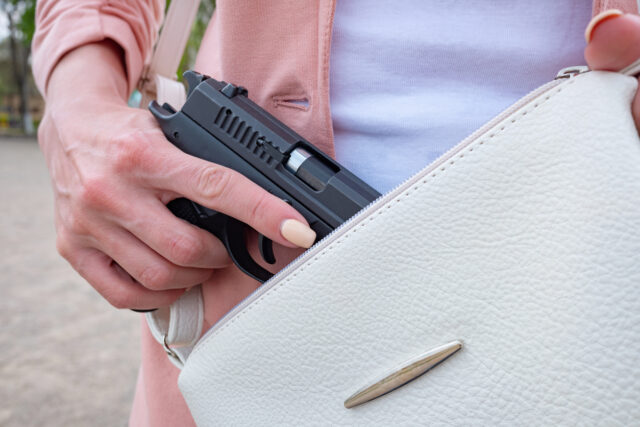A Guide to Arizona’s Firearm Ownership
Arizona, located in the southwestern United States, is renowned for its vibrant gun culture and deeply rooted traditions of firearm ownership. It is one of the most gun-friendly states in the nation.
Arizona has fostered an environment that highly values and safeguards the right to bear arms. Whether in its vast deserts or bustling urban centers, the people of Arizona embrace firearm ownership as a means of self-defense, sport, and personal liberty.
The state’s permissive gun laws and a strong individualistic mindset have transformed Arizona into a hub for gun enthusiasts and a focal point in ongoing discussions about Second Amendment rights.
This guide aims to provide an overview of firearm regulations in Arizona, offering a comprehensive understanding of the intricate details and intricacies involved in owning guns within the Grand Canyon State.
Firearm Storage and Transportation Laws
Firearm ownership comes with the responsibility of safe storage and transportation. In Arizona, regulations exist to ensure the proper handling and safeguarding of firearms. These regulations aim to minimize the risks associated with firearm ownership and promote responsible gun ownership practices.
Gun Storage Security Requirements:
The Arizona state legislature mandates certain storage gun requirements enforced by various law enforcement agencies statewide.
These requirements pertain to the regulations and guidelines established by the state to ensure the safe and secure storage of firearms when they are not in use.
They aim to prevent unauthorized access, accidents, and theft, promoting public safety. It’s important to note that the specific requirements could vary depending on the jurisdiction and type of firearm.
The Arizona Department of Public Safety (DPS) mandates specific storage requirements to prevent unauthorized access to firearms. The following are common elements of storage requirements in Arizona:

Locked Containers or Gun Safes:
It is important to store firearms in locked containers or safes that unauthorized individuals, particularly children and prohibited persons, cannot access. These containers should have sufficient security measures to prevent unauthorized access effectively.
Trigger Locks or Cable Locks:
It is essential to equip firearms with trigger or cable locks to prevent accidental discharge or unauthorized use. These locks serve as safeguards, ensuring that the firearm cannot be fired unless the lock is removed first.
Separation of Firearms and Ammunition:
Store firearms and ammunition separately practice adds an extra layer of safety. It helps reduce the risk of accidental discharge or unauthorized access to loaded firearms.
Compliance with Local Laws:
A gun owner must be aware of local laws or regulations that impose additional requirements or restrictions on firearm storage. These may extend beyond the state-level mandates and encompass municipal or county ordinances.
By diligently following storage requirements, firearm owners in Arizona can minimize the risk of accidents, unauthorized access, and the potential misuse of firearms in criminal activities. Responsible storage practices contribute to the safety of the gun owner and those in their vicinity, cultivating a culture of responsible firearm ownership throughout the state.
Vehicle Carry Laws:
In Arizona, the “vehicle carry laws” for firearms allows individuals to transport firearms in their vehicles, provided they comply with certain regulations. Here are the key aspects of the vehicle carry laws for firearms in Arizona:
Unloaded Requirement:
The gun owner should carry an unloaded firearm in a vehicle. It means the firearm should not have a round in the chamber, and the magazine or cylinder should be empty.
Secured Container or Compartment:
The firearm should be stored in a secured container or compartment within the vehicle, including a locked glove box, center console, trunk, or a container specifically designed for firearm transportation. The purpose of securing the firearm in a container or compartment is to prevent access by unauthorized individuals.
Accessibility:
For self-defense, it is important to securely store the firearm within the vehicle in an easily accessible place. A driver or occupants can quickly retrieve his firearm if the need for self-defense arises.
Concealed Carry Permit Holders:
In Arizona, you must obtain a concealed carry permit (also known as a concealed weapons permit) to carry a concealed firearm. The permit is issued by the Arizona Department of Public Safety (DPS) and requires meeting certain eligibility criteria and completing the application process.
Individuals who own a valid concealed carry permit in Arizona have additional privileges when it comes to vehicle carry. They are generally allowed to have a loaded firearm in the vehicle, even if it is accessible from the passenger compartment.
However, it is important to note that specific laws and restrictions apply to ensure compliance and responsible firearm ownership. Here are some key laws and restrictions that concealed carry permit holders should be aware of:
Prohibited Locations:
It is essential to be aware of areas where carrying a concealed firearm is prohibited, even with a permit.
These include federal facilities, such as post offices and airports, and private properties with posted firearm restrictions, such as businesses that prohibit firearms on their premises. Additionally, there are restrictions near schools and certain public events or venues. It is important to respect and adhere to these restrictions.
Alcohol and Controlled Substances:
It is against the law to carry a concealed firearm under the influence of drugs or alcohol, including controlled substances. It is important to refrain from consuming alcohol or using substances impairing judgment when possessing a concealed firearm.
Duty to Inform:
There is no legal requirement for permit holders to proactively inform law enforcement officers that they are carrying a concealed firearm unless explicitly asked. However, it is a fair practice to comply with an officer’s requests and provide the necessary information when interacting with law enforcement.
Reciprocity Agreements:
Arizona has a “reciprocity agreement” with several other states, meaning your Arizona concealed carry permit is recognized and valid in those states.
However, it is important to check the specific reciprocity agreements and laws of each state you plan to visit to ensure compliance with their regulations.
It is essential for individuals holding concealed carry permits in Arizona to have a comprehensive understanding of the laws and restrictions in place.
Staying informed about any updates or modifications to the laws, regularly reviewing the Arizona Revised Statutes (ARS), and seeking legal advice when needed can help ensure responsible and lawful concealed carry practices.
“The Arizona Revised Statutes (ARS)” includes provisions related to firearm ownership in Arizona. These statutes outline the legal framework for owning, possessing, purchasing, and carrying firearms within Arizona’s jurisdiction.
Firearm Use and Self-Defense Laws
Arizona’s self-defense laws play a significant role in shaping the use of firearms for protection within the state.
Understanding these laws is crucial for individuals who own firearms and may need to employ them in self-defense. This section explores Arizona’s self-defense laws, including the Castle Doctrine, a duty to retreat, justifiable use of force, and self-defense immunity.
Castle Doctrine:
The Castle Doctrine Law permits individuals to employ lethal force to defend their home or castle against intruders.
In Arizona, a variation of the Castle Doctrine, referred to as the “No Duty to Retreat” law, is in effect.
Under this law, individuals are not obligated to retreat before utilizing force, including deadly force, if they hold a reasonable belief that it is necessary to safeguard themselves or others within their dwelling.
Duty to Retreat:
While Arizona has a Castle Doctrine that does not require retreat within one’s own dwelling, it’s important to note that Arizona follows a “Stand Your Ground” approach outside the home.
It means that individuals are not generally required to retreat in public places before using force to defend themselves if they reasonably believe it is necessary.
Justifiable Use of Force:
In Arizona, the use of force, including deadly force, is justifiable if a person reasonably believes it is necessary to protect themselves or others from imminent death, serious bodily injury, or certain enumerated crimes such as sexual assault.
The key is that the belief must be reasonable based on the circumstances known to the person at the time.
Prohibited Persons and Restricted Areas
It is important to understand the individuals prohibited from owning or possessing firearms and familiarize themselves with restricted areas to uphold responsible and lawful firearm ownership. By understanding these restrictions, you can effectively navigate the legal framework about firearm possession and adhere to regulations designed to promote public safety.
Prohibited Categories:
Certain categories of individuals are generally prohibited from possessing firearms under federal and Arizona state law.
These categories include convicted felons, individuals with domestic violence convictions, individuals with restraining orders or protective orders against them, individuals with certain misdemeanor convictions, fugitives from justice, and individuals adjudicated as mentally ill or committed to a mental institution.
Federal Restrictions:
Firearms possession is subject to additional restrictions under federal law, which include prohibiting individuals who are unlawful users of or addicted to controlled substances, those who have renounced their U.S. citizenship, and those who have received a dishonorable discharge from the military, among other categories. It is important to note that these federal restrictions apply universally to all states, including Arizona.
Mental Health Considerations:
In addition to federal and state prohibitions, individuals with mental health adjudication or who have committed to a mental institution may face restrictions on possessing firearms.
Mental health is necessary for determining an individual’s eligibility for firearm ownership; the precise regulations about this aspect may differ accordingly.
Gun-Free Zones:
Designated as “gun-free zones,” certain locations have legal restrictions or prohibitions on firearms possession.
These areas commonly encompass schools, government buildings, airports, and private properties that have chosen to enforce firearm restrictions.
The state’s laws and guidelines promote responsible firearm ownership while considering constitutional considerations, public safety, and individual rights.
By familiarizing oneself with Arizona’s firearm regulations and seeking information from official sources such as the Arizona Department of Public Safety, law enforcement agencies, and legal experts such as The Sorenson Law Firm, LLC, individuals can ensure compliance with the law and contribute to a safe and responsible firearm culture.








